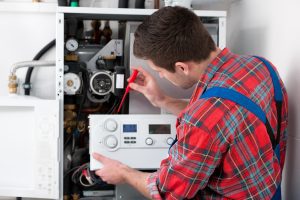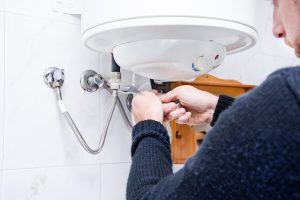If your water heater sounds like a noisy jet engine, you should take action as soon as possible. A water heater that’s functioning in a normal and effective manner shouldn’t make such a disruptive and noticeable sound, after all. It can be next to impossible to deal with water heater sounds that are reminiscent of a jet engine flying overhead.
How Should a Hot Water Heater Sound?
A certain degree of noise is typical for water heaters. That’s how it goes for mechanical devices in general. Humming, tickling and crackling sounds are all pretty common water heater noises. Humming tends to happen after cold water gets into a water heater. Tickling is the result of unreliable water pressure. Crackling, last but not least, is a typical issue in the gas heater realm. It’s usually associated with the presence of water heater burner condensation.
In summary, water heaters don’t function silently. A normal unit may actually sound a lot like a humming desktop CPU.
Electric Water Heater Sounds Like a Noisy Jet Engine
So, your water heater sounds like a noisy jet engine. What may be behind these strange noises? Sediment buildup inside the water heater tank of an electric water heater may bring on crackling, hissing and sizzling sounds. If your unit has too much sediment, these sounds may all become rather typical to you. A water heater that sounds like a noisy jet engine may have particle buildup that happens gradually, too. If you drain and then flush your unit on an annual basis, you may be able to eliminate “sounds like a noisy jet engine” issue.
Is It Normal For A Hot Water Heater To Make Noise?
Yes, some water heater noise is generally no cause for alarm. A unit that is loud like a loud jet engine, however, is a whole other story. Be on the lookout for tapping, screeching and knocking water heater sounds. These water heater sounds can all point to a potential problem.
Reasons Why Your Hot Water Heater Sounds Like a Noisy Jet Engine
So many things can contribute to seemingly inexplicable electric and gas water heater sounds. If you want to keep your heating element in fine working order, you should try to be aware of any and all possible noise triggers. Never brush off any heating element noises that feel out of the ordinary.
The collection of sediment is in no way, shape or form the sole contributing factor to water heater noise woes. Other possibilities to consider are unreliable water pressure, thermostat issues and finally, leakage. If you notice a leaking water heater from the bottom or top never walk past it. It may be the cause of your sound level troubles, after all.
Gas Water Heater Sounds Like a Noisy Jet Engine
Gas powered heaters can make jet engine noise as well. If your gas water heater sounds like an engine, an obstruction might be the cause. Think about the possibility of more sediments. Main burner soot or sediment collection can lead to a unit that sounds like a jet. If you want to stop this noise, simply clean your main burner, period. U-tube obstruction is another potential cause. If you suspect that, you can clean out that tube to do away with the issue.
How to Flush Out Sediments in Gas and Electric Hot Water Heater
A basic and straightforward flushing process may help you handle unit sediment buildup pretty easily. Owners of electric water heaters should turn off their units initially. They can do this by taking the plug out of the power source. If you have a gas unit that sounds like a loud jet engine, you can decrease its temperature settings to the pilot or vacation options.
 Turn off the cold water valve to prevent the tank from filling up yet again amidst flushing. This can spare you some annoyance. After you take care of the cold water valve, attach the drain stopper to a garden hose. Try a garden hose that’s as wide as the aforementioned stopper. Put the water hose on the exterior of your residential property. Gently screw a side of it into your drain stopper.
Turn off the cold water valve to prevent the tank from filling up yet again amidst flushing. This can spare you some annoyance. After you take care of the cold water valve, attach the drain stopper to a garden hose. Try a garden hose that’s as wide as the aforementioned stopper. Put the water hose on the exterior of your residential property. Gently screw a side of it into your drain stopper.
Allow air to travel into your unit. You can open your bathroom or kitchen faucet “hot water side” to do this. If you want, you can open your pressure valve as well. Opening the pressure release valve will permit air to get inside the water tank.
Get a screwdriver to unlock the drain stopper valve. A screwdriver or knife will help you open up the stopper. Move away as a means of permitting hot water to exit your water heater.
Visually assess the flow of the hot water. Don’t approach this part carelessly. Put cold water into the water tank in quick spurts. Allow the cold water intake to remain open for between 20 and 30 seconds total.
Introduce additional cold water to your tank. Do the flushing again. Keep on cleaning out the tank. Wait until the sediment layer is all gone.
Shut the pressure valve to keep water spills at bay. Open up the tank as well. You can then plug in your electric unit. If you have a gas water heater, this is your cue to change its temperature setting from vacation or pilot to the typical level.
Why is My Water Heater Making a Booming Noise?
Do you hear a loud noise that sounds a lot like a boom coming from your water heater? Immoderate sediment accumulation may just be the reason for this. If the tank has too much silt, you should explore the possibilities of sedimentation or mineralization. You may hear a popping sound, too. Popping often is the “consequence” of the presence of mineral deposits and salt.
How Do You Know If Your Water Heater Is Going To Explode?
If the tank of your water heater has collected sufficient silt, you may hear what sounds a lot like a water explosion.
Why Does it Sound Like My Water Heater is Running All The Time?
Maybe your water heater sounds like a noisy jet engine. Maybe it sounds like it’s perpetually running as well. If your unit runs nonstop, something could be wrong with the relief valve. Don’t ever brush off a potentially defective valve. High water pressure could be the reason, too. Loose components in your water heater could even be responsible.
Water Heater Sounds Like Popcorn
Is your unit making a loud noise that reminds you of popcorn? Again, a sediment layer on the lower portion of your tank could be the culprit. The aforementioned flushing can help take care of this buildup. You can also hire a professional plumber to take care of the situation for you.
How to Reduce Noise in Hot Water Heater
 Is your water heater sounding noisier than ever? A few steps may help you get things under control. If you want to take charge of a water heater sounding like a jet engine, you should try the previously mentioned strategies. You can also try insulating the unit. Fiberglass insulation wrapping can go a long way. Room soundproofing is yet another option. Don’t forget that routine maintenance of water heaters can help keep unwelcome sounds to a minimum. It doesn’t matter if you have a gas water heater, an RV water heater or anything else. You should go above and beyond to make upkeep a priority.
Is your water heater sounding noisier than ever? A few steps may help you get things under control. If you want to take charge of a water heater sounding like a jet engine, you should try the previously mentioned strategies. You can also try insulating the unit. Fiberglass insulation wrapping can go a long way. Room soundproofing is yet another option. Don’t forget that routine maintenance of water heaters can help keep unwelcome sounds to a minimum. It doesn’t matter if you have a gas water heater, an RV water heater or anything else. You should go above and beyond to make upkeep a priority.
How to Handle Your Water Heater’s Noise Level
It’s important to figure out how to handle your water heater’s noise issue. Remember that hiring a professional plumber is always a smart idea. A professional plumber may be able to assist you with a rather pressing issue in a few hours or less.
If you have a few simple tools on hand, flushing the unit may be an effective strategy, too. A trip to the local hardware store may be all that you need.
You should never make the mistake of dismissing sounds that come from tankless water heaters and other kinds of units in general. It doesn’t matter if an issue ties in with a tank, a pressure valve, a pressure relief valve, a drain valve, a gas valve or anything else. These heaters are critical for daily life. If your unit doesn’t work, it may stop you from being able to access your water supply safely and easily. That’s not something you need or want.
Note, too, that staying on top of unit irregularities can be beneficial for safety purposes. If something is amiss with your appliance, it could actually become a fire hazard that could endanger your entire family.
The Advantages of Getting Professional Assistance for Unit Troubles
Navigating a pressure relief valve by yourself can be confusing. It can be equally confusing to figure out how to handle a gas valve. Fortunately, you don’t have to deal with bewildering sounds all by your lonesome. All you have to do is make an appointment for five-star professional service from a seasoned and knowledgeable plumbing expert. If you want to say “ciao” to tank headaches, hard water uncertainties and unpredictable noises, you should make your plumbing appointment as soon as possible. An emergency plumber can help you take care of noise difficulties 24 hours a day.
